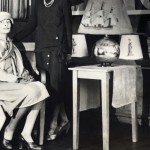an introductory lecture
This morning we shall spend a few minutes
Upon the study of symbolism, which is basic
Icons and cryptograms are written all over
The nickel: one side shows a hunchbacked bison
Bending his head and curling his tail to accommodate
The circular nature of money. Over him arches
UNITED STATES OF america, and, squinched in
Between that and his rump, E PLURIBUS UNUM,
A Roman reminiscence that appears to mean
An indeterminately large number of things
All of which are the same. Under the bison
A straight line giving him a ground to stand on
Reads FIVE CENTS. And on the other side of our nickel
There is the profile of a man with long hair
And a couple of feathers in the hair; we know
Somehow that he is an American indian, and
He wears the number nineteen-thirty-six.
Right in front of his eyes the word LIBERTY, bent
To conform with the curve of the rim, appears
To be falling out of the sky Y first; the Indian
Keeps his eyes downcast and does not notice this;
To notice it, indeed, would be shortsighted of him.
So much for the iconography of one of our nickels,
Which is now becoming a rarity and something of
A collectors’ item: for as a matter of fact
There is almost nothing you can buy with a nickel,
The representative American Indian was destroyed
A hundred years or so ago, and his descendants’
Relations with liberty are maintained with reservations,
Or primitive concentration camps; while the bison,
Except for a few examples kept in cages,
Is now extinct. Something like that, I think,
Is what Keats must have meant in his celebrated
Ode on a Grecian Urn.
Notice, in conclusion,
A number of circumstances sometimes overlooked
Even by experts: (a) Indian and bison,
Confined to obverse and reverse of the coin,
Can never see each other; (b) they are looking
In opposite directions, the bison past
The Indian’s feathers, the Indian past
The bison’s tail; (c) they are upside down
To one another; (d) the bison has a human face
Somewhat resembling that of Jupiter Ammon.
Something of the import of symbolism
With respect to the understanding of what is symbolized.




















Comment form: